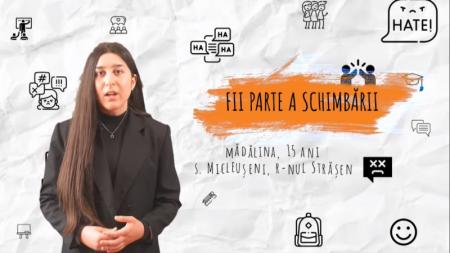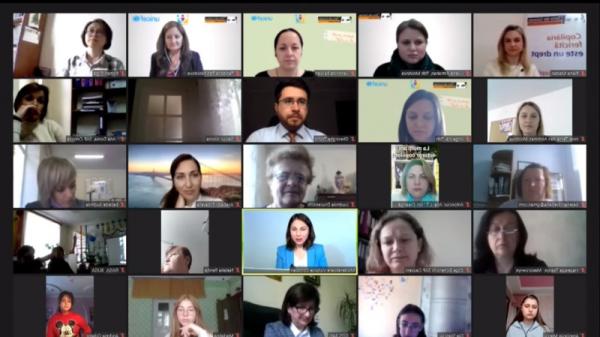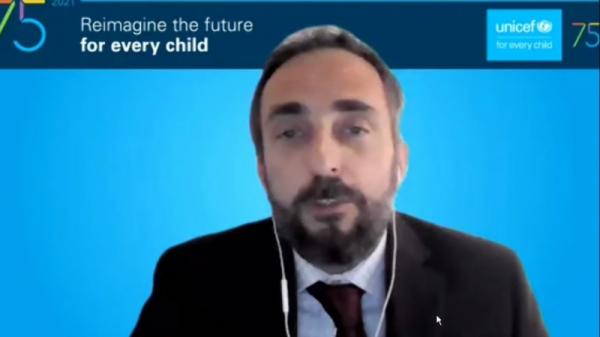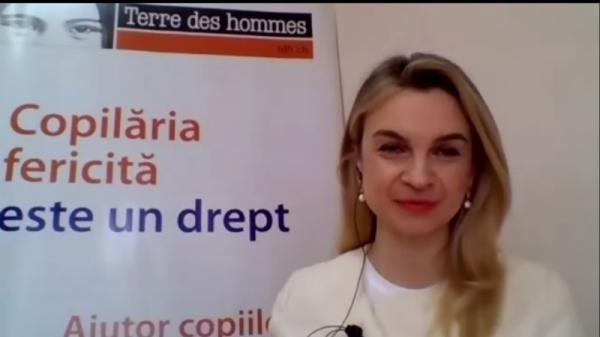About 450 teenagers from all over the country have contributed, both as participants, and as experts, to the "Analysis of the children’s needs for feeling safe and having a school without bullying", conducted by Terre des hommes Moldova. On 1st of June, the Children’s Day, at the conference entitled "STOP BULLYING IN SCHOOLS: children's recommendations", the children held an open dialogue with the authorities, teachers and parents about the problems identified by them and the solutions they propose for a school without bullying.
Over 450 participants in the conference – children from 30 communities countrywide, parents, teachers, child protection professionals and representatives of the Ministry of Education, Culture and Research, UNICEF Moldova and Tdh Moldova – had a debate on the problems identified and the suggestions made by children.
Children as experts
In order to understand what should look like a school without bullying, with a safe and friendly environment for each child, Tdh Moldova team involved children and youngsters from 30 communities in the analysis process. The study was conducted from February to May 2021.
„We wanted to create a space where every child could enjoy his/her right to participate and use his/her own knowledge, skills and experiences. One of our objectives is to prevent bullying situations in schools, and children themselves are the best experts in this field, as well as experts of their life”, Olga Pînzari, child protection officer at Tdh Moldova, said.
Guided by the Tdh Moldova team, 40 teenagers were directly involved in the conduct of the study, collecting data for the analysis from their colleagues.
„Throughout three months, we met the children weekly, we consulted with them on the questionnaire, we took into account their recommendations and suggestions. Then, as researchers, they applied the questionnaire to over 300 peers. Later, the children and youngsters formulated messages that they wanted to convey to peers, parents, teachers and to the authorities", Angelica Russu, child protection officer at Tdh Moldova, explains the process of working with children.
These messages served as a starting point for creating a series of videos through which the children's voice was conveyed and heard by the adults who are responsible for ensuring the children’s safety and well-being.
Andreea from the village of Gherman, district of Ungheni stated that she was mostly motivated to participate in this process by "the fact that we can change something in the future, the fact that there will not be cases of bullying anymore and that would be wonderful”.
Loredana from the village of Lozova, district of Strășeni stated it was quite difficult for children to share their experiences related to bullying. "It was particularly hard to fill in the questionnaires, many children refused to respond and we had to encourage them and explain that it is important to do it. It was quite interesting and beneficial to participate in this project, as it gave us the opportunity to express our views freely, without anyone telling us that we were wrong”.
Children’s messages to peers and adults
In order to better express the problems and the needs identified among their peers, the youngsters involved in the working group built a video story. The video made based on the children's scenario and drawings tells the story of a teenage girl who was daily exposed to the humiliation of her colleagues, illustrating her states and thoughts.
„Oh... back to school... I don't want to see my colleagues, I don't want to hear their ugly, humiliating words. When my colleagues humiliate me, I feel like a soccer ball, kicked from all sides. I feel lonely and worthless in this world. /... / I want to go to a school, where I would feel safe. To be able to say what I feel and how I feel. Both me and my colleagues, we need a school where our opinions are asked and where they really matter ”.
https://www.youtube.com/watch?v=WaMcXZRtGo8
Therefore, to feel protected and safe, children request the authorities to provide a psychologist for every school, along with a code with well-defined rules for addressing the phenomenon of bullying, as well as non-formal education programmes to help pupils prevent bullying.
https://www.youtube.com/watch?v=f5T-GMOdBxk
Children request the teachers to treat everyone equally, regardless of the social, economic status or level of knowledge, to be more careful, open and friendly and, of course, to intervene in bullying situations.
https://www.youtube.com/watch?v=MMMsHR02piw
„Talk to us calmly and clearly, don’t shout at us. Don't compare us to other children, support our choices, trust us. Give us attention, time and care. Be aware of the moods we are going through, of our school life, because we might be in danger and not to confide", is what children expect from their parents.
https://www.youtube.com/watch?v=AU1zQZlWC00
For a safer and friendly environment at school, children recommend to their peers to be kind and respectful to each other, to communicate openly and friendly, to resolve conflicts and overcome bullying situations. "Each of us is valuable and can be part of the change. Be the one who stops bullying!", the adolescents urge their peers.
https://www.youtube.com/watch?v=3gjQ3nQfopw
Debates and solutions for a school without bullying
Both children and parents, teachers and representatives of the Education Directorates pointed out that the greatest gap and necessity is the availability of a psychologist in every school – a professional psychologist, in line with the trends in this field, involved, present and careful to children's needs. The second very important issue that parents, teachers and professionals emphasized is the need for continuous training for both teachers and parents.
„We need the Ministry of Education to provide us with continuous training programmes for all pedagogues - psychological training and case studies. It is very important that teachers know and understand the particularities of the children's ages and of their psychological development. It is also important to have a good, conscious psychologist in every school", Eugenia Macarenco, Senior Specialist at Căușeni Education Directorate, stressed.
„It is necessary to take into account the children's proposals, an efficient teacher-parent-child communication is important. As many form masters and teachers as possible should be provided training in this context and each institution should have a psychologist”, said Iulia Ciuvaga, teacher at Sculeni Theoretical Lycee, district of Ungheni.
Svetlana Pelin, school psychologist from Basarabeasca, pointed out that one psychologist per school is not enough and, in order to counter the phenomenon of bullying, there is a need to focus specifically on interventions, starting from the primary school.
„The solution to any conflict resides in the efficient communication and professionalism. As my colleagues have mentioned, there is a need for school psychologists and for continuous training of all educational stakeholders. For example, following the training provided to us by Tdh Moldova a few years ago – group activities for teachers and parents – we had achieved, in that period, good results in dealing with bullying situations in schools of our district. Unfortunately, with the staff fluctuation and retirement, the expertise was lost", stressed Aliona Saviuc, head of the Subdivision for Curriculum Management and Continuous Vocational Training of Fălești General Education Directorate.
Natalia Madan, parent, author of Planeta mami blog, considers that parents need training in communication, they need to constantly learn how to communicate effectively with their children at all ages, not to criticize and not to ignore the child when he/she tells them something. A very important fact is to validate all emotions.
Conclusion
Natalia Grîu, State Secretary at the Ministry of Education, Culture and Research, who attended the debates, requested an official report with all the recommendations to be analysed by the Ministry, stressing that this school year was especially complicated because of the pandemic, and many of the existing problems have aggravated even more.
„We understand that various bullying situations and other delicate issues that you have faced this year were perhaps more sensitive and complicated than ever, you had less the chance to talk, to share, to have live communication with the pedagogues, with the school psychologist, with the form master and, especially, with your friends", the State Secretary told the children.
Ilija Talev, UNICEF Moldova Deputy Country Representative, mentioned that the issue of bullying cannot and should not be solved without the active participation of children – they are the ones who go through this phenomenon and suffer because of it. "I want to thank all the children who actively involved in this process. You are an excellent example and I would like to encourage other children to join the process of bullying elimination”, Ilija Talev stated.
Elena Madan, Terre des hommes Moldova Director, emphasised that all messages, problems and solutions mentioned by the participants in the conference are extremely important for Terre des hommes as a child rights protection organization. "They will help us shape our future actions and see how we can better support the children”, Elena Madan concluded.
The „ Analysis of the children’s needs for feeling safe and having a school without bullying" is part of the "Joint efforts to combat bullying in Moldova" Project, implemented by Terre des hommes Moldova in 30 schools countrywide between August 2020 and May 2021, with the support of UNICEF Moldova, ChildHub and Oak Foundation. "STOP BULLYING IN SCHOOLS: children’s recommendations".
Conference took place with the financial support of ChildHub.
- Zaloguj lub zarejestruj się aby dodawać komentarze
- 637 widoków











